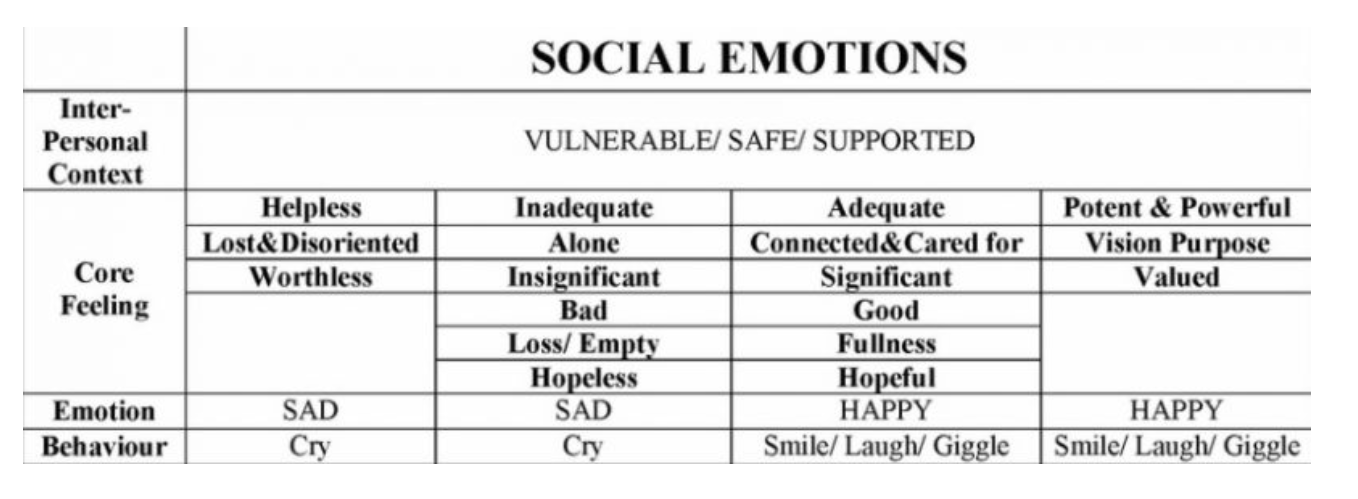Cultural alexithymia A problem somewhere in experiencing or expressing or resolving your emotional state. Scientific studies concluded 10-15% have it but Doug Tatary peronal experience as a clinical was 85%-95%
The brain is modular and people argue about which modules. Big picuture about the brain is that we have
- phyical brain (
- reptilian
- regulates body systems
- emotional brain (lymptic)
- looks after relational dynamics
- mammals fight/flights dominance hierachy
- bonding survival social emotions
- rudimentary form of communications
- thats why we can bond with dogs (mammal) and not bond with reptil
- bonding and group related status they are processing
- intellectual brain
- allows to thing about the word instead of only being in the world
This trichotomy is recreated every 10 to 15 years
| BEF | MacLean's Triune brain model | | Pop Culture | Vajrayana Buddhism | Gurdjieff | | ------------------ | ---------------------------- | --------------- | ------------------- | ------------------- | | Physical Brain | Reptilian complex | Jocks | Body | Moving Centre | | Emotional Brain | Paleomammalian complex | Artsie Types | Speech | Emotional Centre | | Intellectual Brain | Neomammalian complex | Nerds and Geeks | Mind | Intellectual Centre |
Our Culture is biased thowards physical and intellectual. There is arts and dance etc. but no real understanding for the emotional layer.
Why we miss the understanding of the emotional brain if we evolved through the layers. In the blue layer of Intergral Theory - Evolutionary Development there was so space to show emotions. The system depended on it.
You are going to cry, i will give you something to cry about. It was traditional to stop crying.
- Now in a postmodern society people want a deep connected relationships. That is way different that in that past.
- The main question to ask is "How do you feel about that?"
- Non judgemental curiosity
Now we are primed for the emotional layer but not equiped to answer. Instead of the emotion we tell stories, metaphores or believes
Any intense interpersonal encounter that is not fully experienced and expressed (resolve) will become part of your sense of self or worldview instead of something that happened to you.
Interpersonal feelings elicit core feelings which in turn elicit emotions (and their behaviours)
Working with Emotions: What is Emotional Processing? Emotional processing, according to the Bio-Emotive Framework, is the explicit choice to integrate the rational, emotional, and somatic aspects of an experience or conflict that isn't going away.
Physically, we slow down and feel our body. We acknowledge that we have a nervous system and a fight/flight response. We acknowledge that we get triggered and that those triggers show up inside our physical body, as tension, pain, or the inability to sit still, for example.
Intellectually, we acknowledge that we have a story or a rationalization about what's going on that we cling to, which justifies our behaviors, viewpoints, and mindsets.
Emotionally, we acknowledge that there is a historical activation that is being brought up in the present moment, which is clouding our ability to make our highest and best choices. Underlying our narrative (intellect) we have feelings we must feel and release.
emotional-brain Within the emotional domain of processing, there as an entire world to explore and become friends with. Our emotional brain (Limbic System), developed before the neocortex, and is actually fluent in the language of emotion which image, association, and symbolism.
By learning to follow those associations and images, we learn to find the subtle and subconscious mapping patterns that started living in us at a young age. Once we understand these internal maps, we can begin to create new internal maps that serve our needs, rather than old fears.
9 Core feelings


Contrasting affect:
Happy, Said, Angry, Fairful
Joy, Saidness, Anger, Fair, Shame
feeling your way through a problem vs thinking/contemplating trough a problem
Feeling believes
- something about yourself and your relationship to the world (x and y, i am alone and worthless and i deserve to be loved)
- core feelings and relational feelings tend to me mixed together in the feeling believe
- eg "I am not safe, and my father won't protect me"
- eg "I am not worthy of my fathers protection"
- eg "I am not safe and no-one will protect me"
- eg "I am not worthy of my fathers protection"
- eg "I am not safe, and my father won't protect me"
- core feelings and relational feelings tend to me mixed together in the feeling believe
- seems to not get stimulated in meditation practices
- emotional impressions as your psychic experiences in your childhood
- this differentiates between affect and emotions
Podcasts
- https://www.jameswjesso.com/a-crash-course-in-emotional-intelligence-w-douglas-tataryn-ph-d
- https://deconstructingyourself.com/meditation-emotions-bio-emotive-framework-douglas-tataryn.html
- https://anchor.fm/emerge/episodes/Dr--Douglas-Tataryn---Emotions-in-Meditation-and-Human-Development-e423ti?mc_cid=44db381f85&mc_eid=9a67518d15